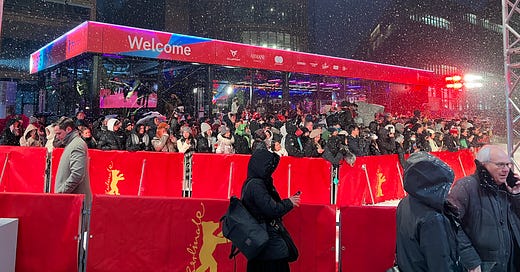Berlinale 2025 FILMS: The Good, the Okay, and the Bad
An overview and critical survey of my Berlinale: standout films, political themes, and surprising choices.



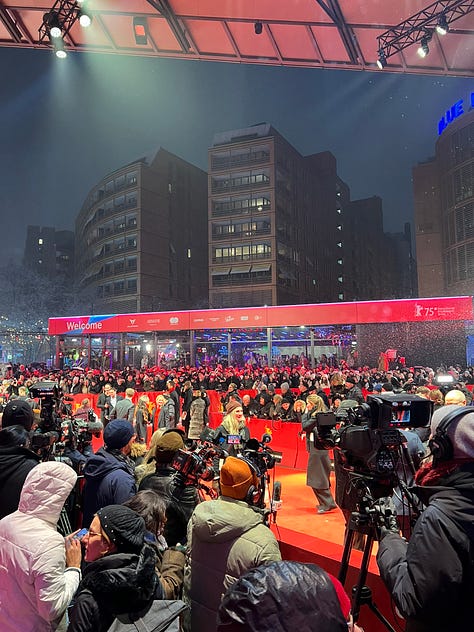
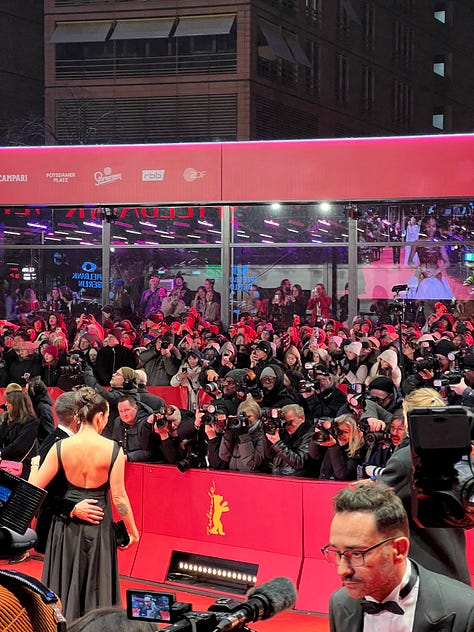
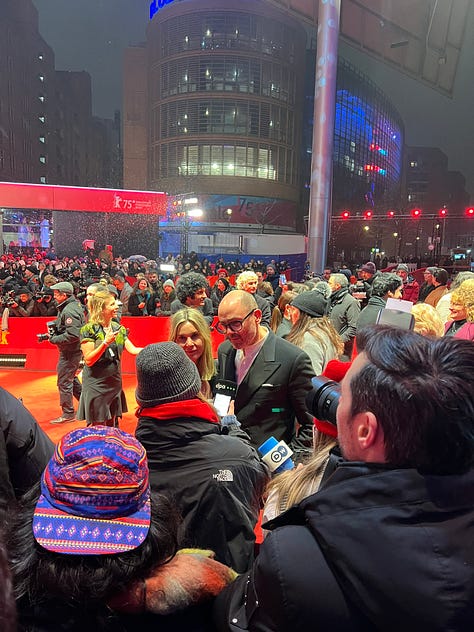

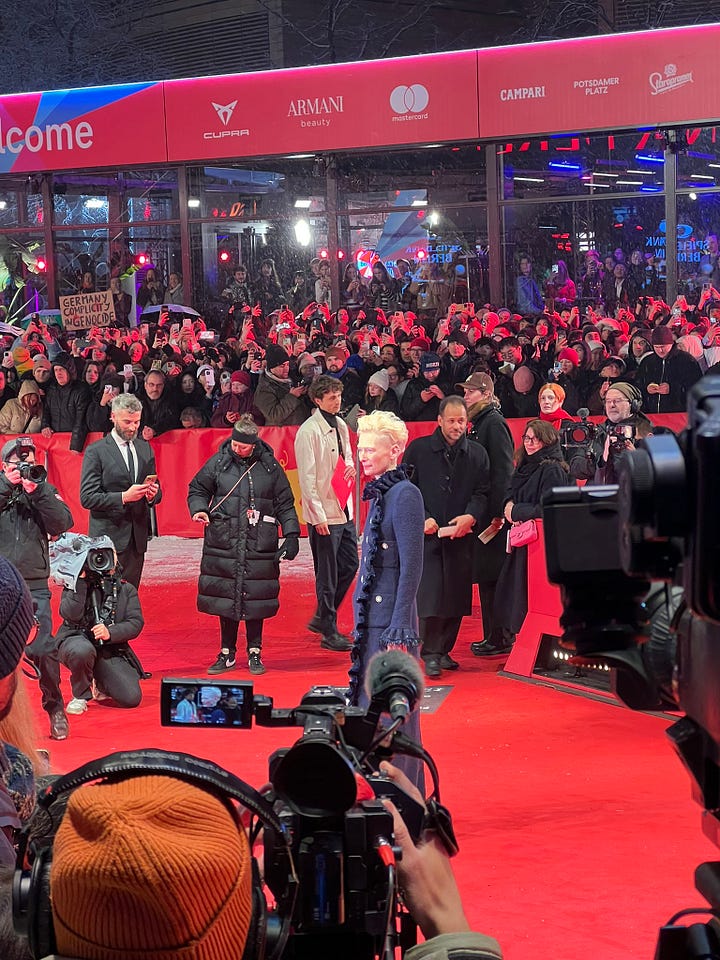
First, my viewing numbers by section:
Competition: 6
Special: 10
Forum: 2
Classics: 3
Perspectives: 2
Panorama: 2 (including a double feature)
Shorts: 1 set of 4
Second, my political score (since this is the “political” film festival):
Weighted average: C+ (2,7 grade from 11 films)
N/A: 16 films
Takeaway: Although I didn’t prioritize political vs. non-political films and didn’t have a large selection, both the mediocre average and the number of films without political themes are concerning for a “political” film festival.
What’s funnier is that the film with the best politics, in my opinion, was Mickey 17—a big studio film that I overheard one critic call “good even though it’s a Hollywood movie.”
I will only choose a selection for each of the following categories. My full ranked list can be found here. As with most film festivals I’ve attended, this one neatly followed my ¼ of the films I see I like average.
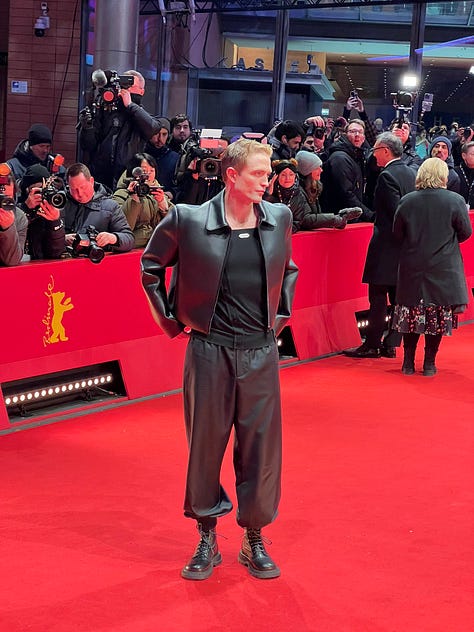
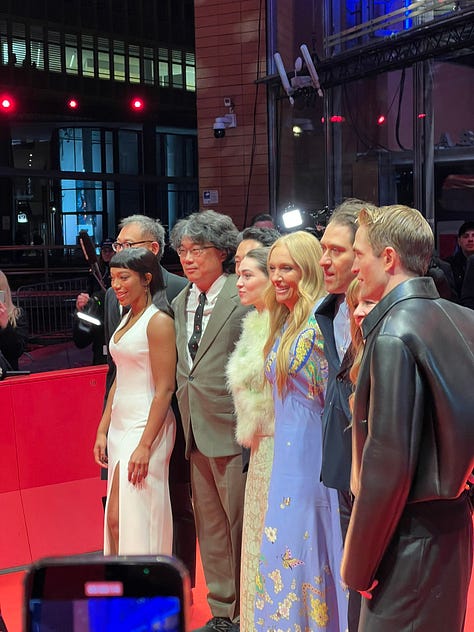

The Good
Heldin (Late Shift)
This film stars Leonie Benesch (“The Teacher’s Lounge” and “September 5”) as a nurse working the late shift at an understaffed hospital in Switzerland. It follows the intensive nature of the job in a wildly impressive way that’s hard to describe in a simple synopsis. For example, on Letterboxd:
“Despite the hectic environment, Floria cares for her patients with expertise and full dedication. Although she gives her all, the shift gradually spirals out of control – until it eventually leads to a dramatic outburst.”
This simply doesn’t capture how important this film is beyond simple genre/plot conventions. “Heldin” director Petra Volpe used the Berlinale premiere to highlight nursing staff and bring attention to a badly underfunded profession/industry. (Remember when we banged on pots and pans to celebrate these same people almost five years ago? They didn’t stop working, but we stopped paying attention.)
“Heldin” was just released in Germany and Switzerland and I highly recommend it to everyone; and for those in North America, put it on your list so you don’t forget.
In the meantime, check out my critic-friend’s interview with director Petra Volpe:
Mickey 17
If there hadn’t been an expertly acted and directed film about an underrepresented and underpaid profession, “Mickey 17” would easily have been number one. In one respect, the latest release from Korea’s greatest director of all time, Bong Joon-ho, a big-budget sci-fi for Warner Bros., was this festival’s fluke, and not in the same way the following film surely was. Months of squeamish calendar adjustments paid off big, helping give some meaning to Berlinale as the “political” film festival.
Full review coming after a second (maybe third?) viewing.
A Complete Unknown
Technically not a real Berlinale film, considering it was released theatrically in North America two months ago. Smart move by the Berlinale director to get Timothée Chalamet on the red carpet to capture a younger audience for an aging film festival. Nonetheless, I watched it, I liked it a lot, and like many others, I’m back on the current iteration of intensely listening to Dylan once again.
Having just seen the film a second time, it quickly and surprisingly improved in appeal. Chalamet is unbelievable, Monica Barbaro steals most scenes she’s in, and Edward Norton plays happy hick folk legend Pete Seeger in the most genuine way possible.
If I Had Legs I’d Kick You
Rose Byrne, who picked up a lead performance win for this, plays a mother on the verge of a never-ending nervous breakdown. Her daughter has a gastric disorder that she can’t manage, her husband is a navy man on the high seas, and the camera refuses to shoot Byrne in anything other than the tightest of close-ups; so much so that the daughter doesn’t actually appear fully on screen until the final moments.
In the style of many A24 films, this one is frenetic and high-energy, always trying to place you on the nervous sweat beads of Byrne’s brow. The casting of A$AP Rocky and Conan O’Brien is two of the most interesting “that’s a choice” decisions, as the former plays the neighbor in the motel where Byrne and her daughter move after a gaping hole appears above their apartment bedroom, and the latter plays Byrne’s therapist and his therapist colleague in the most subdued, unnatural performances of one of the funniest humans on earth.
This film follows in the “isn’t parenting really hard” category of films, which would be boring if not for Byrne’s career-best performance and gaping-hole metaphor that works, simply.
Kontinental ‘25
We follow a man – once a great Romanian athlete – grumbling around the modern world of Cluj, Romania, now down and out and about to be kicked out. Instead of going to the streets, he hangs/strangles himself (don’t worry this isn’t a spoiler) against the low-rise radiator until death. Then, abruptly, we switch narration à la “Psycho” to the bailiff (Eszter Tompa) responsible for kicking him out.
Already in the shoulder-chip position of being Hungarian-born in Romania, the bailiff can’t seem to get her job in order as she breaks down in misery, holding herself responsible for the man’s suicide. She tries consoling herself with a number of people, none of whom seem willing to properly reciprocate empathy.
This absurdist dramedy feels more like writer and director Radu Jude excising something in between films. In fact, that’s exactly what this iPhone-shot film is in between his recent festival hit, “Do Not Expect Too Much From the End of the World”, using some of his crew from the upcoming “Dracula Park”.

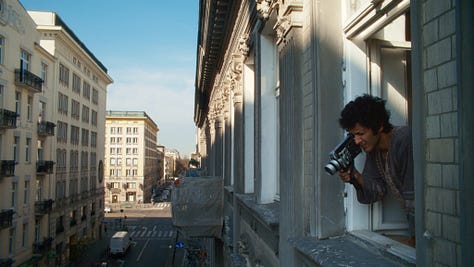

The Okay
Lurker
Alex Russell’s (“Beef” and “The Bear” writer) first feature. About a tired theme of a parasite attached to a creative artist and the escalation of absurdities leading to an inevitably metaphorical ending; an ending I quite enjoyed and somehow felt fresh. Real big “Nightcrawler” vibes with the L.A.-ness of it all.
Letters from Wolf Street
An young Indian man (Arjun Talwar) documents the comings and goings of his street in Warsaw. Mostly about the funny little moments of what it means to be a foreigner in a famously homogenized (to put it nicely) society. It examines the position of the doc’s short-lived boom operator (also a foreigner) and director’s friend who had committed suicide, both of whom trying to maintain the difficult position of being a rebel while attempting foreign integration. The director plays a central role in that examination but doesn’t burden it with his own (explicit) traumas. Really hoping Talwar goes down the Ross McElwee route, but I think he’s hungrier than that.
Comment ça va? (How Are You?)
Short French philosophical film featuring stock-animated animals banished to a limbo-island awaiting the Great Catapult to shoot them back to…? An appropriately bleak film that riffs on Gramsci’s reflection on interregnum, written from within a Fascist prison: “The old world is dying and the new world struggles to be born. Now is the time of monsters.” Makes more sense when the co-director called out the genocide in Gaza and our complicity in it through weapon sales and not actively trying to end it. If you need to ask how you are (comment ça va), then maybe things aren’t so good.
Köln 75
Fun and energetic (as all jazz-laden films tend to be) but thankfully doesn't overdo it. A standard race against the show starting on time dramedy for an epic Keith Jarrett jazz concert in 1975. John Magaro is great as Jarrett; even in a German film as a mild-mannered side character hunched over with back problems, Magaro shines.
The Ice Tower
Uses the fantasy of filming a fairy tale of a young woman (Clara Pacini’s debut) escaping foster care in 1970s France, looking for a new mother-figure. She may or may not have found one in the Snow Queen (diva actress played by a subdued Marion Cotillard), who presides over both the production of the film and her magical kingdom of snow and crow. It’s unclear if Pacini’s character is looking for a mother, herself, or both. I was following around every corner in a hypnosis, similar to the “I Saw the TV Glow” identity crisis confused via media representation. However, it didn’t deliver in the end.
Ancestral Visions of the Future
A poetic adventure from Lesotho director Lemohang Mosese narrating his past, his people’s past, their position within the modern world as a disruption from “ancestral visions”, and a visually experimental documentary all in one. I was not expecting this level of introspection and reflection, which doesn’t play well during a multi-viewings per day schedule.
Reflection in a Dead Diamond
Would almost certainly be better to watch midway through an acid trip. A Bond-inspired mid-century modernist picture about diamond thieves with incredible cinematography and editing combo, but even all the diamonds in the Côte d'Azur can't hide the missing plot/story substance.
Islands
Beach-sun-soaked missing person mystery with a raspy as hell Sam Riley. Unfortunately played it too safe, feeling more like a factory-produced, post-”Challengers” tennis noir. The main thesis: if you live permanently on vacation, how do you take a vacation?
The Settlement
Two brothers, one middle-school-aged and the older one recently out of criminal trouble, get a job at the factory where their father was accidentally killed in a workplace “accident”. The truth, may I use the cliché, is more complicated than it appears, but not in a sustained manner that compels the drama forward. Guilt and conscience and ‘who is the real criminal’ are all scratched at but left aside like an unused dog chew toy.
Dreams
A film that could really really work if some script rewrites and recasting were performed. A young ballet dancer (Isaac Hernández; that boy can dance!) crosses the Mexican border to pursue a career in San Francisco, where he forms an extremely on-the-nose toxic relationship with a wealthy woman (Jessica Chastain) who fetishizes both dance and Mexican culture on behalf of her father’s foundation. The pairs’ motivations are confused throughout, and, as both of my friends noted, independent of each other, the chemistry is not there.
The Bad
The Sense of Violence
Doc about anti-communist representation in Korean cinema. I wish it was more interesting than just providing a surface-level showcase of old footage and the tired thesis of “the thing repressed persists.”
Two Times João Liberada
Without spoiling it, it’s safe to say that the only interesting bit for me came during the final five minutes, when the real story begins.
The Safe House
The exact kind of bourgeois crap that the French New Wave was reacting against, which is ironic because this film hides from May ‘68 in Paris as much as possible.
The Thing with Feathers
Pure vanity project for Cumberbatch. “More mourning!” is about the only direction he was taking.
Underground
Unwatchable. It’s about a woman sensing something that transcends space and time. I did not catch that.
The Light (Das Licht)
embarrassing opening festival film, especially for the Berlinale; i overheard an American critic/journalist on the train afterwards say that there were "so many fucking boomer moments in that movie", that's as good a review as I could write.
Thank you once again for checking out my Substack. Hit the like button at the top or the bottom of this page to like this entry, and use the share and/or res-stack buttons to share this across social media. Leave a comment below if the mood strikes you to do so. And don’t forget to subscribe if you haven’t done so already.

